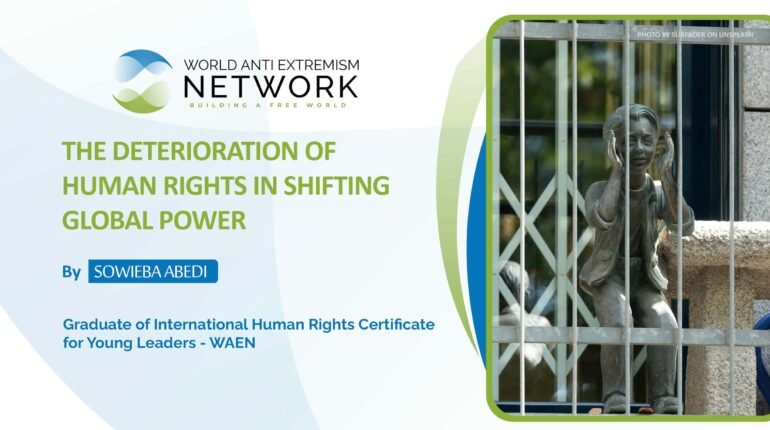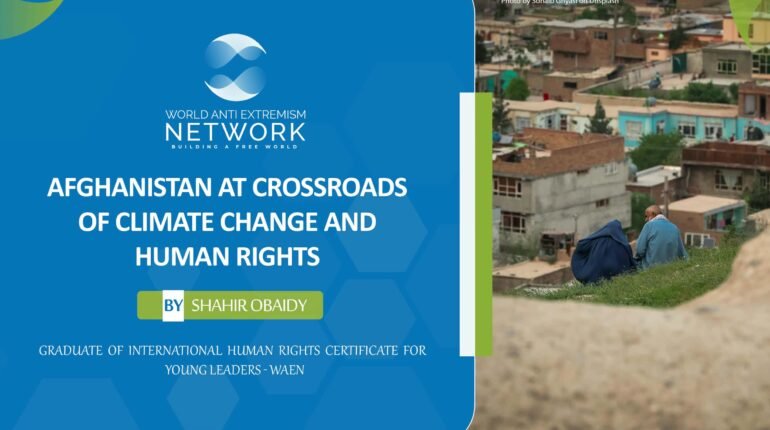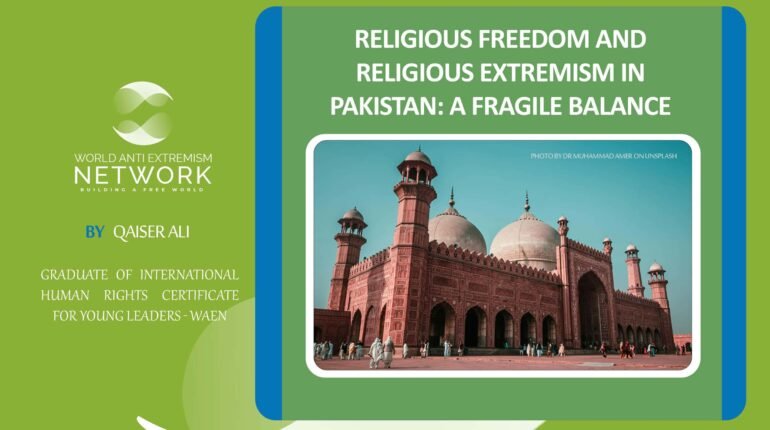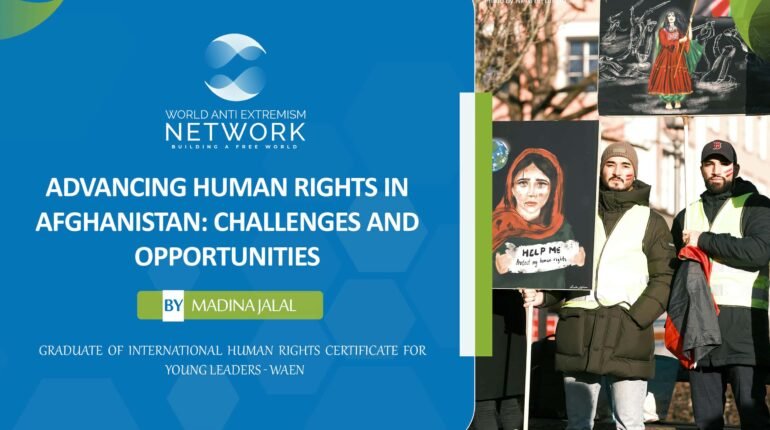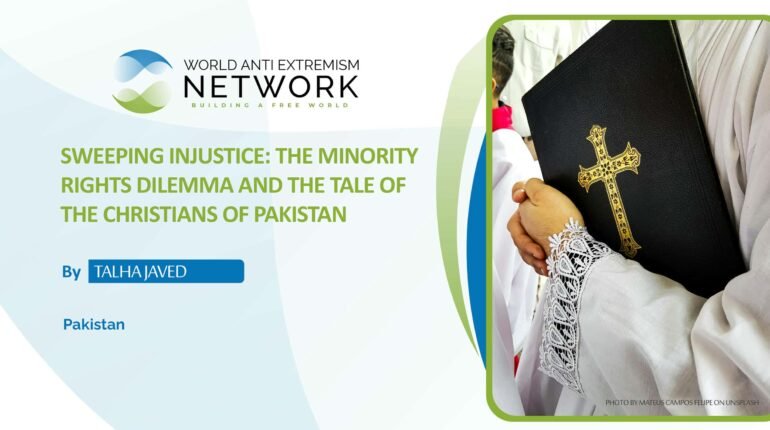From Accusation to Asylum: The Asia Bibi Case and Pakistan Blasphemy Law Crisis
- World Anti Extremism Network
- From Accusation to Asylum: The Asia Bibi Case and Pakistan Blasphemy Law Crisis
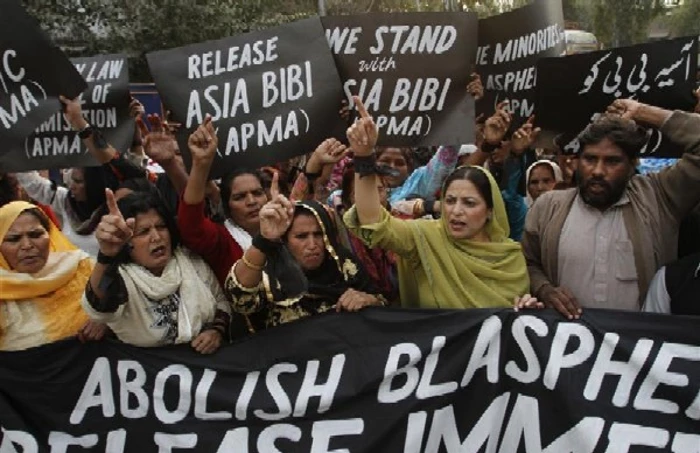
Protesters demand release of Asia Bibi, in Lahore, Pakistan, November 21, 2010. | (Photo: Mohsin Raza)
- From Accusation to Asylum: The Asia Bibi Case and Pakistan Blasphemy Law Crisis
- By Hamza Niaz
- Jan 3, 2024
Share on:
Background of The Asia Bibi Case:
In October 2009, Asia Bibi – a Christian woman residing in a small village in Punjab, Pakistan, was accused of blasphemy. It all occurred during an argument with other farmhands concerning a sip of water. There were allegations that she said something disrespectful about Prophet Muhammad (PBUH) when they quarreled over it. Hence, her arrest and trial under Pakistan’s blasphemy laws including Section 295-C which lays down a death sentence for its violators.
International condemnation followed due to the gravity of the situation, as Asia Bibi faced the possibility of death. For many years, she remained on death row while appealing her case through various courts. These laws are a legacy of the colonial period; however, they have been modified during post-independence times to become more severe and contentious.
The Blasphemy Law Crisis in Pakistan
It is noteworthy that Pakistan’s blasphemy laws have been criticized by many scholars for being arbitrary, elastic, vitiating, and discriminatory. Blasphemy laws in Pakistan can be found in sections 295, 296, 297, and 298 of the Pakistan Penal Code but Section 295-C, calls for the death penalty against anyone who ‘uses any derogatory remarks’ against the Holy Prophet Muhammad. Even though the purpose of the law was to safeguard religious sensitivity it has been exploited as a means of oppression against prominent opponents, especially people of Christian and Hindu faiths.
I found that one major weakness and thus a major flaw of the blasphemy laws is the absence of any protection against grievance fabrication. If a person is accused of blasphemy, their lives are at serious risk irrespective of whether the person did it or not. Most of them have been attacked by mobs and even when the legal system sets them free, there is always a continued risk. This is evidenced by the fact that Asia Bibi’s accusers wanted her dead even after the Supreme Court in Pakistan set her free.
The Legal Journey: From Conviction to Acquittal
Asia Bibi, who was given the death penalty in 2010 by a trial court, is the first woman to be punished for blasphemy in Pakistan. Her legal representatives did all they could to appeal the decision, but the case was postponed severally due to its sensitivity. Often, this was due to threats from religious groups who oppose blasphemy and use pressure and threats to affect the decisions of the judges and lawyers, who were involved in the case.
In 2011, the situation escalated when two prominent Pakistani politicians, Salman Taseer, Governor of Punjab, and Shahbaz Bhatti, the Federal Minister for Minorities Affairs, called for the repeal of Pakistan’s blasphemy laws after defending Asia Bibi. Tragically, both men were assassinated for their stance, highlighting the dangerous consequences of challenging these laws.
In 2018, Pakistan’s supreme court released Asia Bibi on the grounds of lack of concrete evidence and inconsistency of the testimonies of the witnesses. The court also pointed out that the issue of the likelihood of the crime being committed had not been proven and the accused seemed to be driven more by personal vendetta rather the religious extremism. This judgment was one of the most historical in Pakistan’s legal history. However, it aroused angry reactions from fundamentalists who support Sharia law, calling for her execution
The Aftermath: Protests and Asylum
Although the Supreme Court of Pakistan ruled in favor of Asia Bibi, her ordeal was far from over. Islamist parties, such as the burka-cloaked Tehreek-e-Labbaik Pakistan (TLP), took to the streets nationwide, demanding her execution and accusing the judiciary of betraying Pakistan and Islam. Under pressure, the government first negotiated with the protesters and eventually agreed to allow the filing of a review petition against her acquittal.
During this time, Asia Bibi was under police protection, as there were widespread threats to her life upon her release from prison. Her family faced similar dangers and sought intervention from the international community. In 2019, Asia Bibi was granted asylum in Canada, where she and her family were finally freed from the constant threats they faced.
It was the end of a long, hard-fought search for asylum, though the problems connected to Pakistan’s blasphemy laws remain unsolved. While the Asia Bibi case may have exposed the fragility of the system, changes to these laws are slow to be implemented. Those who fight against such laws also face threats and killings.
International Reactions and Human Rights Concerns
Asia Bibi’s case gained much attention across the globe hence press, human rights organizations, ambassadors, and activists wrote and demanded Asia Bibi’s release besides the repeal of section 295C of Pakistan’s penal code on blasphemy laws. While human rights activists including Amnesty International and Human Rights Watch have for long condemned such laws as a violation of human rights most especially freedoms of speech and religion.
The European Union, the United States, and Canada were among the countries that called upon Pakistan to safeguard Asia Bibi’s life and reconsider its blasphemy laws. Her subsequent escape to Canada was hailed by human rights activists as a victory, but it also highlighted the international community’s concern over the rising threat of extremist groups in Pakistan.
Critics have condemned the blasphemy laws for violating the rights of religious minorities in the country, and they are also concerned about the negative repercussions on freedom of speech within Pakistan. Most journalists, writers, and activists today tend to avoid any subjects related to religion in their work, as they can easily be accused of blasphemy, leading to violent reactions from supporters of extremism.
Lasting Consequences for Pakistan
Thus, the Asia Bibi case has left a significant impact on Pakistan’s legal, social, and political realms. On the one hand, her acquittal was a triumph for the legal system, and a definite, however, a rare example of the movement of judges against the fundamentalist terrorists. On the other hand, what happened soon after her release from the trial and the government’s initial attempt to appease radical groups was evidence of how Pakistan is plagued by deep-seated problems of extremism.
The case has also raised concerns over the questions of reformation of Pakistan’s blasphemy laws. The fact that these laws are being abused is now well known, but major change is still hampered by the threat of opposition from religious extremism. The murder of Salman Taseer and a leader of the minorities Shahbaz Bhatti also shows that the advocates of change are in danger.
Thus, for Pakistan to progress, it must address the problems that allow the blasphemy laws to be misused. This requires leaders who are willing to advocate for changes to the existing Arab Muslim constitution. It will also necessitate an independent judiciary that protects the rights of all citizens without discrimination based on their beliefs in God.
Conclusion
Asia Bibi’s case serves as a testament to the dangers posed by blasphemy laws in Pakistan. It underscores the urgent need for legal changes to prohibit the misuse of these laws and to protect religious minorities from persecution. Although Asia Bibi was acquitted and granted asylum, these events also revealed societal rifts in Pakistan and the power of extremist groups.
The fundamentalist and draconian blasphemy laws in Pakistan continue to threaten society, and without serious legal reforms, cases like that of Asia Bibi are bound to recur. Therefore, ongoing support from the international community is essential to help Pakistan improve its human rights and religious freedom policies.

About the Author
Hamza Niaz, a graduate of International Relations from the University of Peshawar, specializes in climate change and economic stability, with a focus on Sri Lanka. He has worked with USAID Pakistan on property rights and land registration reforms and has championed youth empowerment and peacebuilding through the Global UGRAD program and the Directorate of Youth Affairs KP. Currently, he serves as an Article and News Analyst for The World Anti Extremism Network, highlighting global issues of extremism and human rights.
The opinions expressed in these articles are solely those of the authors and do not reflect the views or positions of the organization. If you find any information incorrect, please contact (research@worldantiextremism.org), and we would be happy to assist you. You can download, distribute, and reuse this work, provided you credit the author and cite the original source.
Related Articles
Subscribe to our newsletter and stay updated.
Contact
Toronto, Ontario, M1L 0E5 Canada
Subscribe to our newsletter and stay updated.
Contact
Toronto, Ontario, M1L 0E5 Canada
Subscribe to our newsletter and stay updated.
Contact
Toronto, Ontario, M1L 0E5 Canada


